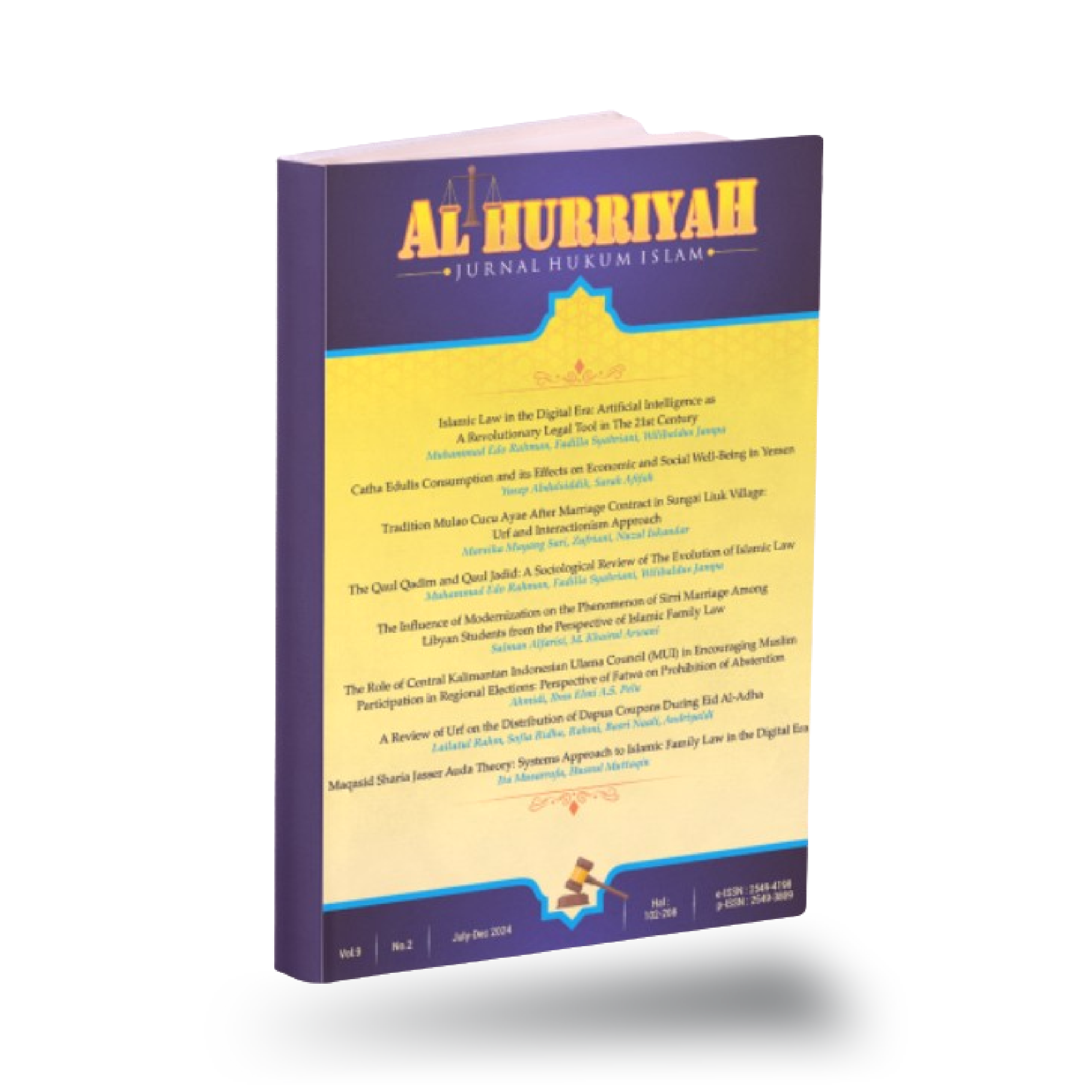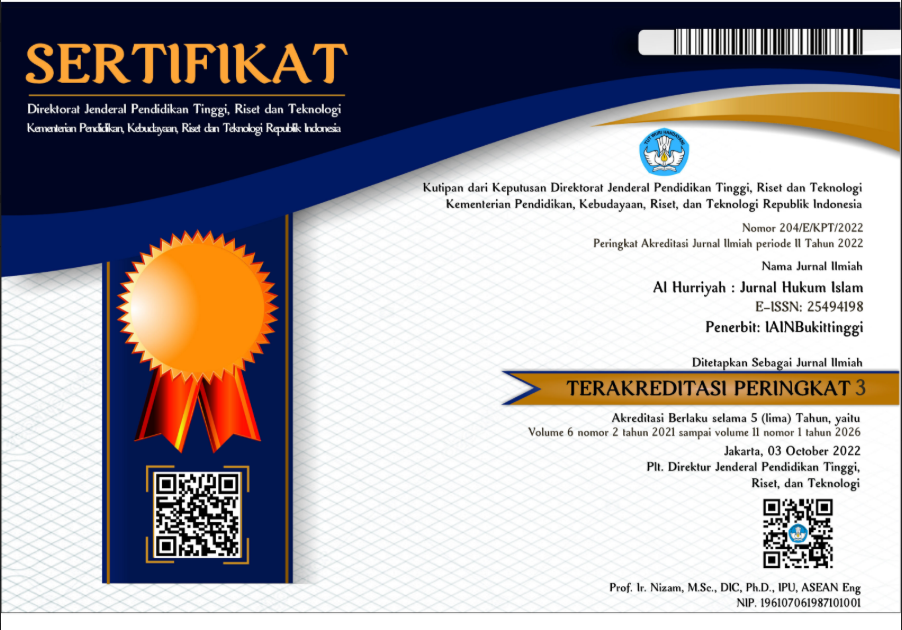Analysis of Sigli Syariah Court Judges' Opinion On Ex-Husband's Marriage During Their Ex-Wife's Iddah Period
DOI:
https://doi.org/10.30983/alhurriyah.v9i1.7771Keywords:
Marry, Judge's View, Iddah periodAbstract
This research aims to answer the analysis of the Sigli Syariah Court Judge's views on Circular Letter of BIMAS Ministry of Religious Affairs of Indonesia (Surat Edaran BIMAS Islam Kementerian Agama RI) on Marriage During the Wife's Iddah Period. In 2021, the Islamic Community Guidance of the Indonesian Ministry of Religion issued Circular Letter Number: P-005/DJ.III/Hk.00.7/10/2021 concerning Marriage During the Wife's Iddah Period. In the provisions of letter E number 3 of the Circular Letter, it is stipulated that a man's ex-husband can marry another woman after his ex-wife's iddah period has been completed because it is feared that covert polygamy will occur. Interestingly, in the statutory provisions, there are no provisions relating to the prohibition on a man's ex-husband marrying another woman while he is still in his ex-wife's iddah period. This research is empirical legal research with a qualitative approach, and data collection in this research uses observation, interview techniques, and then analysis. This research found that, in Islamic law, there is no provision for an iddah period for men, and a man does not have to wait for the end of his ex-wife's iddah period if he wants to marry another woman. Sigli Syariah Court Judge argued that the Circular Letter No. P-005/DJ.III/Hk.00.7/10/2021 is in line with the al-maslahah al-ammah theory because it contains beneficial values and aims to avoid hidden polygamy. The value of the benefits contained in the circular letter will be properly realized if formal laws are followed.
References
Alfarisi, Salman, and M Khairul Arwani. “A Critical Analysis of the Inconsistencies in Amina Wadud Gender Equality Movement in the Islamic World.” Hakamain: Journal of Sharia and Law Studies 3, no. 1 (October 2024): 37–47. https://doi.org/10.57255/hakamain.v3i1.323.
al Asqolani, al Hafidz Ibnu Hajar. Bulughul Maram min Adillatil Ahkam. Makkah: al Haramain, tt.
al-Dimyati, Abu Bakar bin Muhammad. I’anah al-Talibin, juz 4. Libanon: Dar al-Ihya al Turas al-Arabi.
Azzam, Abdul Aziz Muhammad dan Abdul Wahhab Sayyed Haawwas. Fiqh Munkahat Khitbah Nikah dan Talak. Jakarta: Amzah, 2009.
Basyir, Ahmad Azhar. Hukum Perkawinan Islam. Yogyakarta: UII Press, 2007.
Dahlan, Abdul Aziz. Ensiklopedia Hukum Islam 2 Cet Ke-VII. Jakarta: Ichtiar Baru Van Hoeve, 2006.
Husni, Syukriya, Fadilla Syahriani, Alfi Husni, Annisa Wahid, and Valensius Ngardi. “Determination of Nasab of Children Outside of Marriage in the Islamic Legal System: The Role and Decisions of Religious Courts in Indonesia.” Hakamain: Journal of Sharia and Law Studies 3, no. 1 (October 2024): 26–36. https://doi.org/10.57255/hakamain.v3i1.332.
Irawan, Candra Sabtia. Monogami atau Poligami?. Yogyakarta: An Naba’, 2007.
Manshur, Abd al-Qadir. Buku Pintar Fikih Wanita. Jakarta: Zaman, 2009.
Muhtar, Kamal. Azaz-azaz Hukum Islam Tentang Perkawinan. Yogyakarta: Bulan Bintang, 1993.
Muslehuddin, Muhammad. Filsafat Hukum Islam dan Pemikiran Orientalis. Yogyakarta: Tiara Wacana Yogya, 1991.
Nasution, Harun. Ensiklopedia Islam. Jakarta: letar Van Hoeve, 1999.
Sabiq, Sayyid. Fikih Sunnah, terj. Muhyiddin Syah. Bandung: PT. al-Ma’arif, t.t.
Sastroadmojo, Arso. Hukum Perkawinan Islam di Indonesia, Cet. III. Jakarta: Bulan Bintang, 1981.
Summa, Muhammad Amin. Hukum Keluarga Islam di Dunia Islam. Jakarta: PT Rajagrafindo Persada, 2004.
Syarifuddin, Amir Hukum Perkawinan Islam Di Indonesia Antara Fiqh Munakahat Dan Undang Undang Perkawinan. Jakarta: Kencana, 2007.
Yanggo, Chuzaiman T. Problematika Hukum Islam Kontemporer Cet I. Jakarta: PT. Pustaka Firdaus, 1994.
Zuhaili, Wahbah. Al-Fiqh al-Islam Wa Adillatuhu. Damaskus: Dar al-Fikr, 1996.
Downloads
Published
How to Cite
Issue
Section
Citation Check
License
Copyright (c) 2024 S Sukiati, Imam Yazid, Muhammad Irfan

This work is licensed under a Creative Commons Attribution-ShareAlike 4.0 International License.
Authors who publish with this journal agree to the following terms:
- Authors retain copyright and grant the journal right of first publication with the work simultaneously licensed under a Creative Commons Attribution-ShareAlike 4.0 International License that allows others to share the work with an acknowledgment of the work's authorship and initial publication in this journal.
- Authors are able to enter into separate, additional contractual arrangements for the non-exclusive distribution of the journal's published version of the work (e.g., post it to an institutional repository or publish it in a book), with an acknowledgment of its initial publication in this journal.
- Authors are permitted and encouraged to post their work online (e.g., in institutional repositories or on their website) prior to and during the submission process, as it can lead to productive exchanges, as well as earlier and greater citation of published work (See The Effect of Open Access).





